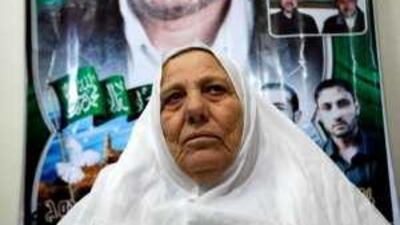RAMALLAH // Although it has promised revenge for the killing of one of its senior leaders, it is not at all clear that Hamas has any interest in heightening tensions with Israel for the moment, at least not in Gaza. There, in fact, reaction to the killing of Mahmoud al Mabhouh has been noticeably subdued. A fragile truce since last year's Israeli offensive just about holds, and Hamas has been careful to prevent militants from other factions from firing rockets across the border. Since the news of the killing in a Dubai hotel came out on Friday, Hamas officials in Gaza have kept a low profile, content to let the Syrian leadership of the movement take the lead.
On Friday, Ahmed Yousef, a senior Hamas official, said only that the time and location of retaliation was up to the Ezzedine al Qassam Brigades, the military wing of Hamas. In this, the message from Hamas is the same as that from the Lebanese Islamist movement Hizbollah, which, after the assassination of one of its senior military leaders, Imad al Mughniyeh, in Damascus in 2008, vowed retaliation at a time and place of its choosing. So far, no such reaction has occurred, a fact not lost on observers.
"If we look at Mughniyeh's example, Hizbollah has said hundreds of times that it will take revenge, but it hasn't done so yet," said Mkhaimar Abusada, a Gaza-based analyst. Mr Abusada suggested that Hamas would do the same and if any retaliatory measures were taken, they would not come now and likely not from Gaza. "I don't think Hamas is in a position to retaliate right now, at least not from Gaza. Hamas knows that the Israeli reaction will be disproportionate."
More likely, he suggested, Hamas would seek to avenge the killing of Mabhouh abroad, perhaps through a similar assassination or in the form of abductions. Assad Abu Shark, a professor at al-Azhar University in Gaza, said Hamas should ensure that some kind of retaliation does happen. "There must be retaliation," Mr Abu Shark said. "Otherwise, Israel will be encouraged to undertake more assassinations."
The killing itself is seen by Palestinians - among whom there is no question that Israel was responsible the killing - as a warning that Israel will take its time and not be dissuaded by place, legality or political context if it wants to pursue someone. Over the years a number of Hamas leaders have been killed in Israeli assassinations. The spiritual leader Ahmed Yassin, a quadriplegic, was killed in Gaza in 2004 when two missiles struck his wheelchair as he returned from morning prayers. A month later, Abdel Aziz Rantisi, who succeeded him, was similarly killed when two missiles struck his car. Khaled Meshaal, the current Hamas leader, was himself the target of a botched Israeli assassination attempt in Jordan in 1997.
Some Gazans were certainly sceptical that any retaliation was forthcoming. Wael, a 30-year-old accountant, who did not want to give his full name, said Hamas leaders had been killed before, notably Ahmed Yassin, and no revenge had been sought in spite of fiery rhetoric to the contrary. Anyway, Wael suggested, "Hamas has more important issues then avenging this man's death. They have the siege, a Shalit [prisoner exchange] deal. I don't think they will throw it all aside just for one guy."
Ahmed Yousef said he expected the UAE authorities would conduct a thorough investigation. "This was an assassination on UAE territory and an infringement on sovereignty that cannot be tolerated by any country. Dubai wants to show that it is safe and secure so I'm sure it will do whatever necessary to find those Israeli Mossad agents responsible." okarmi@thenational.ae * With additional reporting from Erin Cunningham in Gaza City

